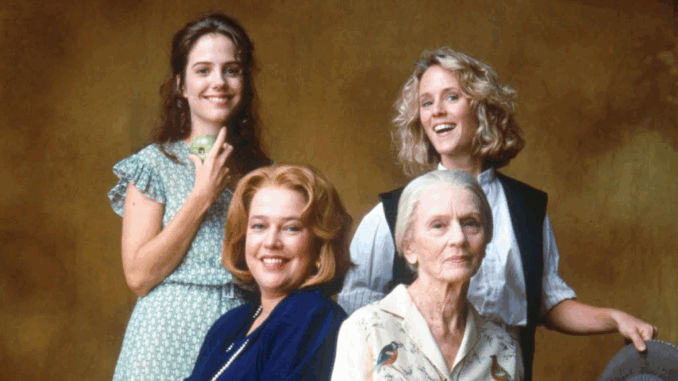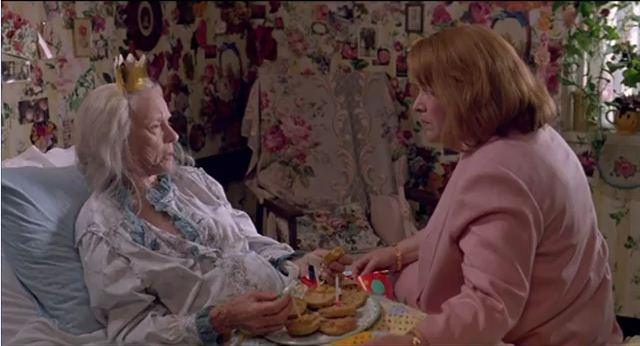
A Trial Cloaked in Suspicion
In the heart of Fried Green Tomatoes, a scene unfolds that marries Southern gothic charm with high-stakes emotion: the courtroom trial of Idgie Threadgoode and Big George. They stand accused of murdering Ruth’s abusive husband, Frank Bennett—a man who had vanished after coming to Whistle Stop demanding his child. While the audience knows the truth of his fate (thanks to Sipsey’s quietly heroic act), the trial presents a different kind of confrontation: not just legal, but moral, cultural, and deeply personal.
It is here, in the heat of a segregated courtroom, in a world where gender roles and racial injustice define outcomes, that Idgie proves who she really is.
Idgie’s Defiance Meets the Law
From the first moment she enters the courtroom, Idgie exudes her usual irreverent charm. She’s dressed in her masculine suspenders, her hat tilted just so—an emblem of resistance in a room steeped in Southern tradition. She does not shrink under the weight of judgment. Instead, she meets it head-on with wry humor and unwavering loyalty.
But beneath the jokes and mischief, Idgie is fully aware of what is at stake. Her life. Big George’s freedom. Ruth’s peace. And so, as the courtroom tries to box her in, to press her into some acceptable shape, she resists with every fiber of her being.
She refuses to be made into a woman who apologizes for loving fiercely, for choosing her own family, for protecting the people who mean everything to her.
Big George and the Threat of Injustice

The inclusion of Big George in the trial is no accident—and no small detail. As a Black man in 1930s Alabama, he is placed in even graver danger than Idgie. The accusation itself is enough to seal his fate in the eyes of many. He stands, stoic, quiet, but his life is on the line.
What makes the trial scene so charged is the way it intertwines race and class with gender and power. Idgie and Big George are united not just in their innocence, but in their shared marginalization. They are the “wrong kind” of people in the eyes of the law: a tomboyish woman with no husband, and a Black man with too much dignity.
But they are also both beloved in their community. And it is this love—this community built on loyalty rather than convention—that becomes their shield.
Reverend Scroggins: An Unlikely Savior
The most surprising twist in the trial comes when Reverend Scroggins takes the stand. Known in the community as a rigid, fussy preacher, he becomes Idgie’s unexpected ally. Under oath, he claims that Idgie and Big George were attending a weeklong revival in Valdosta, Georgia, at the time of Frank’s disappearance.
Everyone in the courtroom knows it’s a lie.
But it’s a beautiful lie. A necessary one. A lie told not to obscure the truth, but to protect those who have lived it.
This moment is steeped in subtext. Reverend Scroggins, a man of the cloth, breaks a commandment to uphold a higher moral principle. It’s as though even the rigid pillars of religious authority are willing to bend in the face of Idgie’s loyalty and Big George’s quiet strength.
It is this testimony that sways the court. And as the gavel falls, Idgie and Big George are free—not just legally, but symbolically. They have been seen, heard, and defended, in a place that rarely allows such grace.
The Emotional Undercurrent
While the courtroom scene is tinged with humor and Southern eccentricity, its emotional stakes are enormous. Ruth sits in the gallery, her eyes brimming with fear and gratitude. Sipsey, the true architect of Frank’s end, watches in silence, protected by the lie. Idgie never flinches, never gives them up.
In that room, she is not just defending herself—she is defending the entire chosen family they’ve built together. The Whistle Stop Café. The memories. The safety of Ruth’s son. The dignity of Big George and Sipsey. Everything hangs in the balance.
And Idgie carries it with grace.
Feminine Resistance in a Masculine Arena
The courtroom is traditionally a man’s domain—judges, lawyers, rules, punishments. But Idgie, without any law degree, flips the power dynamic on its head. With wit, defiance, and unflinching loyalty, she wins a battle not just of legality, but of identity.
She redefines what justice means—not punishment, but protection. Not confession, but solidarity.
In this way, the courtroom scene is about much more than guilt or innocence. It is about the right to live a life that doesn’t fit the mold. It’s about how love—in all its forms—sometimes requires bold lies, brave stands, and silent sacrifices.
The Legacy of the Trial
After the trial, life in Whistle Stop doesn’t go back to “normal”—because there never was a “normal” to begin with. That’s what makes the story so powerful. The café continues serving fried green tomatoes. Sipsey continues to watch over Ruth’s son. Idgie continues to run wild, but now with Ruth by her side, with a deeper sense of purpose and protection.
The trial becomes another stitch in the tapestry of their lives—a chapter not of fear, but of resilience.
It teaches Evelyn, in the present-day timeline, that rebellion isn’t always about violence. Sometimes, it’s about telling the truth in a way that the world can’t undo. Or telling a lie so beautiful, it saves a life.
Conclusion: Justice Beyond the Gavel
The courtroom scene in Fried Green Tomatoes isn’t just a clever piece of storytelling—it’s a meditation on justice. On loyalty. On how the law often fails those who need it most, and how community steps in to fill the gaps.
Idgie doesn’t win the trial because of evidence. She wins because of character—hers, and that of the people who believe in her. Because in the end, that’s what Fried Green Tomatoes is about: the power of chosen family, the strength of quiet alliances, and the courage to stand up when it matters most.
Even if it means lying to a judge.
Even if it means risking everything.
Because sometimes, saving your people is the only justice that counts.
